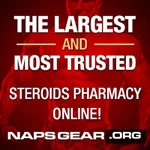I have been having some health symptoms for a few years now. Most have been pretty minor such as itchy dry skin, insomnia, depression, fatigue, and poor nutrient absorption to name a few. I've noticed that these symptoms have been progressively been becoming worse. After searching about the symptoms, the results that come up keep pointing to me being hypothyroid. I keep wondering how this could be because I've had thyroid tests in the past with them coming up "normal." Did some more searching, and it seems that TRT or using AAS in general doesn't just stop your testosterone production, it also affects thyroid signaling through the same feedback loop. The testes produce a hormone called thyroid releasing hormone (TRH), and when you take AAS or go on TRT (especially long term), production of this hormone is reduced. A good doc upon giving someone TRT will also give some adjustment to thyroid--or so I've read.
How many of you knew this? It doesn't seem to be a part of the regular information about TRT out there.
I went to my doc with all these clinical symptoms of hypothyroidism, but since my TSH (measured 3.3) is still in the "normal" range, he will not treat me. So you can still have normal production of TSH and T4, still have hypothyroid symptoms, but TSH and T4 are the only tests most regular doctors will perform (my PCP included). The information I've found says that you must also measure T3 and Reverse-T3 (and the resulting ratio between them). The reason for this is because the body starts to convert T4 into Reverse-T3 instead of T3. If the ratio between T3 and Reverse-T3 gets off you have problems. T3 should be around 20 times higher than Reverse-T3. Too much Reverse-T3 clogs the receptors so they can't receive normal T3, thus the hypothyroid symptoms. My doc actually told me that he would get reviewed if he tested me for T3 and that they simply don't measure it. He couldn't tell me why, but I was unable to persuade him so I ordered my own tests through MyMedlab. I'll be getting my results in about another day, and if they are what I suspect they are, I should be able to use the results to tell my doc that I need T3. If he still won't, I'll find another doc who will or I will probably get it on my own.
Those of you who cycle, have you normally included T3 in your cycle? If so, did you know your reason for doing so?
How many of you knew this? It doesn't seem to be a part of the regular information about TRT out there.
I went to my doc with all these clinical symptoms of hypothyroidism, but since my TSH (measured 3.3) is still in the "normal" range, he will not treat me. So you can still have normal production of TSH and T4, still have hypothyroid symptoms, but TSH and T4 are the only tests most regular doctors will perform (my PCP included). The information I've found says that you must also measure T3 and Reverse-T3 (and the resulting ratio between them). The reason for this is because the body starts to convert T4 into Reverse-T3 instead of T3. If the ratio between T3 and Reverse-T3 gets off you have problems. T3 should be around 20 times higher than Reverse-T3. Too much Reverse-T3 clogs the receptors so they can't receive normal T3, thus the hypothyroid symptoms. My doc actually told me that he would get reviewed if he tested me for T3 and that they simply don't measure it. He couldn't tell me why, but I was unable to persuade him so I ordered my own tests through MyMedlab. I'll be getting my results in about another day, and if they are what I suspect they are, I should be able to use the results to tell my doc that I need T3. If he still won't, I'll find another doc who will or I will probably get it on my own.
Those of you who cycle, have you normally included T3 in your cycle? If so, did you know your reason for doing so?









